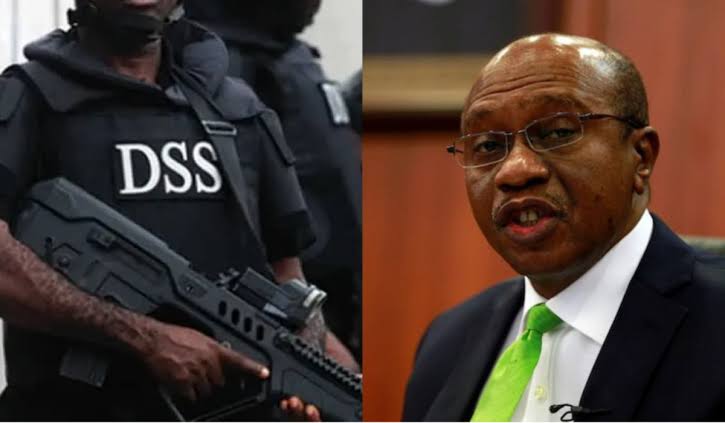Many Nigerians were dazed following reports of the $15 billion foreign debts allegedly accumulated by the Central Bank of Nigeria (CBN) during the tenure of the suspended governor, Godwin Emefiele.
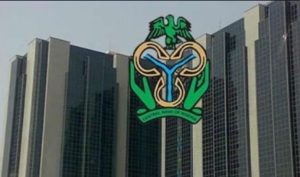
The CBN’s first audited financial statements in seven years released on Friday indicated that the apex bank received combined $15 billion cash from JP Morgan and Goldman Sachs in one year, reports The Nation.
The CBN Group had entered into a securities lending agreement with the two firms, pledging its holdings on foreign securities in return for cash.
Nigeria’ total foreign reserves currently stand at $34.1 billion.
Financial experts who spoke to our correspondents on the situation yesterday said the development did not bode well for the national economy.
A former Assistant Director of Research and Planning in CBN, Prof. Jonathan Aremu, said it was scandalous that the bank got itself into such a mess.
The Professor of International Economic Relations at the Covenant University (CU), Ota said he could not readily quantify the economic loss from the CBN action for Nigeria.
He said: “I am aware that the CBN hasn’t published its financial report for years. “This wasn’t the situation in my days at the CBN, because we were always publishing the CBN report year in, year out.
*“But things have gone so bad at the CBN.*
“One cannot readily quantify the colossal economic loss to the country because what we are talking about is unheard of.
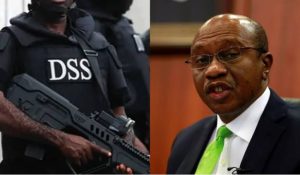
“No central bank in the world has had its integrity so impugned like we have seen under Emefiele. This is not good for the country at all.
“My take is that whoever is involved in bringing the nation to its knees through this debt incurred must not go unpunished.”
The CBN, Aremu said, is not allowed to borrow any money whatsoever from anywhere, because that would be contrary to its core mandate of ensuring the operational efficiency of the micro and macro economy.
The Registrar/CEO, National Institute of Credit Administration (NICA), Prof. Chris Onalo, wondered: “What was the money borrowed for? Was it borrowed for a certain productive sector of the economy?
“Was the CBN in dire financial straits to the extent that it needed to expand its operational efficiency, in terms of monitoring institutions under its regulations?
“Was it approved by the Presidency and was the National Assembly carried along in the whole process?”
He said it would be immaterial to conclude on the propriety or otherwise of the CBN decision to borrow until his questions were answered.
A professor of Economics, Sheriffdeen Tella, said: “I am not aware of any CBN Act that allows it to borrow money from Development Finance Institutions on behalf of the federal government.
“Even if it must borrow, it must do so in agreement with these two other institutions — Ministry of Finance and DMO.
Tella, who is of Olabisi Onabanjo University, Ago Iwoye, Ogun State, added: “The reason why the CBN isn’t obliged to borrow is because it can easily compromise the external reserves which is domiciled with the World Bank and other DFIs.
“So, if the borrowing was done without recourse to the proper procedures, it is an illegal exercise.”
On his part, Dr. Austin Nweze, a political economist, said it was simply a bad omen. “The federal government has an obligation to service the debts regardless of the paucity of funds,” he said.
Echoing similar sentiments, Mr. Usman Philip, a financial expert, wondered why the CBN had to borrow in the first place.
“If it is established that the CBN did borrow, I don’t think that will bode well for the economy. Considering our present circumstances as a struggling nation, this is bad.”
Dr. Oluwatobi Oyefeso, former Managing Director, Nigerian Capital Market Institute of the Security & Exchange Commission (SEC), said: “First, huge foreign debt creates serious shortage of investment in infrastructure, education, health and other areas of the economy of the borrowing country as the limited foreign reserve or revenue goes to servicing foreign debt.
“Second, serious decline in the inflow of forex supply, thereby causing the depreciation of the local currency, Naira,with its inherent effect of an upward inflationary trend.
“Third, there is a link between the high level of foreign debt and dependency on foreign assistance on the one hand and the human rights abuses on the other hand.
“Economic distress causes governments to cut social spending, and it reduces the resources it has to enforce labour standards and human rights respectively.”
The President, Association of Bureaux De Change Operators of Nigeria (ABCON), Dr. Aminu Gwadabe, said while the report on CBN’s cash receipts from JP Morgan and Goldman Sachs has settled the request for clarity and data sharing information to boost honesty and transparency of the apex bank’s operations, it has also “tended my fear for liquidity shortages in the midst of dwindling inflows from investors and other sources coupled with an estimated backlogs of $6 billion.”
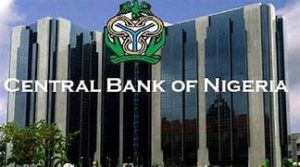
Gwadabe stressed the need to encourage market participants in terms of sourcing forex from independent window, separation of regulation and monetary policies.
According to him, exchange rate unification can only thrive where the market participants are given enabling environment and review of the financial architecture.
“Most importantly, the report has also revealed the reserve account of CBN and the need to safeguard the local currency. This will eliminate or reduce the attacks on our local currency by Shylock speculators,” he said.
Chief Executive Officer, Centre for the Promotion of Private Enterprise (CPPE), Muda Yusuf, said the cash receipt was curious and confusing.
He said: “The CBN may need to provide further insights. Foreign debt obligations should typically come under the radar of the Debt Management Office and duly authorised by Parliament. These foreign currency exposures to JP Morgan and Goldman Sachs are not documented anywhere as part of our public debt.
“As at first quarter this year, our exposure to multilateral institutions was $20.7 billion, which was 48.4 per cent of our external debt.
“Bilateral debt is the second major component of foreign debt. These are borrowings from other countries like China, Germany, Japan. It was a total of $5.2 billion or 12 per cent of external debt as at first quarter of 2023.”
Continuing, he said: “The third major component of external debt is commercial debts made up largely of Euro bonds. It was $15.6 billion or 36.6 per cent of foreign debt as at first quarter this year.
“These are the major external debt exposures documented by the DMO. The exposure of staggering $15 billion to JP Morgan and Goldman Sachs surely needs further clarification by the apex bank and other relevant fiscal authorities.”
However, a former Executive Director, Keystone Bank Plc, Richard Obire, said the CBN debts to the private international financial institutions would seem abnormal to most folks, understandably.
According to him, it does not seem unlawful, however. Were it illegal, the statutory public auditors of the CBN would have said so in its just released audited financial statements.
“What most people are familiar with is the CBN borrowing on behalf of the Central Government through the issuance of long term debt instruments to finance infrastructure.
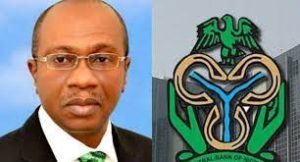
“The CBN also normally ‘borrows’ by selling short term treasuries to extract excess liquidity from the financial markets to moderate inflation,” he told our correspondent yesterday.
Obi said it would seem that the reported CBN cash borrowing from JP Morgan and Goldman Sachs was meant to support the Naira in 2021, 2022 and right up to when the multiple exchange regime was abolished recently.
He explained that the reported debt was fully secured with securities owned by the CBN which enter the calculation of its foreign reserves.
“Instead of borrowing cash, the CBN could have liquidated the securities pledged to raise the cash it needed at the time. It probably considered that its balance sheet and reserve position will look better if the securities had remained in the books,” he said.
According to Obire, it might also have been the case that the securities were of a tenor that their earlier liquidation would result in transactions costs that were better avoided. The CBN is permitted by law to invest in securities of tenors of no more than five years.
“Most people who watch the foreign exchange market in Nigeria already know that our reserve position is not as robust as it should be due to serious systemic factors outside the control of the CBN. This awareness is already factored into their business and investment decisions in the economy. This revelation of the CBN borrowing from JP Morgan and Goldman Sachs will not introduce any new effects,” he said.
He said the CBN appears to be the convenient “fall guy” now but the public should not forget that the Buhari Government was as bad as any government could have been.
“The CBN was not responsible for the insecurity that scared investors and their money from pouring into Nigeria. The CBN was not responsible for the unprecedented level of theft of our crude oil with the associated massive loss of foreign currency earnings,” he stated.
*Naira4Dollar, RT200 projects gulp N141b*
The CBN confirmed in the report that it spent N141 billion on both the Race to $200 billion in FX Repatriation (RT 200) rebate and Naira4Dollar remittance schemes. Both programmes were cancelled under the CBN Acting Governor, Folashodun Shonubi leadership.
The apex bank said it spent N137 billion on the RT200 plan in 2022. In 2021, the expenses for the Naira4Dollar incurred were N4 billion and were classified as intervention expenses.
The schemes were designed to increase non-oil exports and diaspora remittances to increase foreign exchange inflows into the economy.
“Rebate expenses represent expenses incurred by the CBN in connection with the RT200 and Naira 4 Dollar schemes, which the bank introduced to enhance foreign currency inflow, diversify the sources of FX inflow, increase the level of non-oil exports, ensure stability and sustainability of FX inflows, and support export-oriented companies to expand their export operations and capabilities.
“The Bank incurred N137 billion in 2022 on the RT200 scheme. In 2021 Naira4Dollar expense to the tune of N4 billion was captured under intervention expenses,” the report said.
The RT200 Forex Programme, an initiative of the Bankers’ Committee, was created to raise $200 billion in non-oil export earnings over the next five years.
It was designed to incentivise exporters in the non-oil export sector to repatriate and sell their export proceeds in the foreign exchange market.
This was to be achieved through value-adding exports facility extension to companies to boost production and more forex earnings to the economy.
The plan provided a rebate of N65 for every $1 of repatriated non-oil export revenues paid to semi-finished and finished goods exporters, while unprocessed items exporters were to receive a rebate of N25/$.
Available data shows that repatriation due to the programme increased by 40 per cent from US$3.0 billion in 2021 to US$5.6 billion at the end of 2022 while the momentum for 2023 is showing strong numbers and impressive prospects.
Similarly, the Naira4Dollar Scheme was launched in March 2021 as an incentive for foreign money transfer senders and beneficiaries. The policy called for a payment of N5 for every $1 received in remittances.
The apex bank also put its contingent liabilities on outstanding litigations at N56.4 trillion.
The financial sector regulator said the liabilities rose to the current level from N51.7 trillion in the previous year.
However, the apex bank’s directors estimated that the outflow of economic resources from the litigations was not probable.
The financial statement was signed on behalf of the board of directors by suspended CBN Governor, Godwin Emefiele, and Deputy Governor, Corporate Services Directorate, Edward Adamu.
The report said: “Included in the litigations is a significant case with total claims of N56.3 trillion, in which judgment has been given against the Bank and other co-defendants in prior years and where the Bank’s appeal against the judgment is currently pending before the appellate courts.”
Continuing, it said: “There was a 2nd defendant on this legal case, who had lost at the Federal High Court and the Court of Appeal (the Bank was a party to the 2nd defendant’s appeal) and the matter is currently at the Supreme Court awaiting ruling. The judgment sum amounts to GBP2.159 billion with 15 per cent annual interest calculated with effect from 22 June 1995”.
The CBN said that a high level of success is expected at the Court of Appeal based on professional legal advice and the likelihood of outflow of economic resources is not probable. Consequently, no provision was recognised in the financial statements.
“The Directors are also of the opinion that all known liabilities and commitments which are relevant in the assessment of the state of financial affairs of the Bank have been taken into consideration in the preparation of these consolidated and separate financial statements,” it said.
Speaking on his decision to suspend Emefiele, President Tinubu said Nigeria’s financial system as run by the CBN under him (Emefiele) was ‘rotten’.
Briefing Nigerians in Paris during a visit to France, the President said measures were being taken to address the alleged irregularities done by Emefiele.
“Then the financial system was rotten,” Tinubu said.
“Few people make bags of our money and then you yourself, you stopped sending money home to our poor parents. Several windows… but that is gone now, is gone.
“The man is in the hands of authorities, something is being done about that. They will sort themselves out.”

